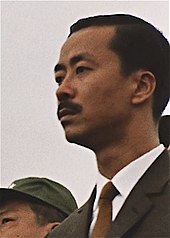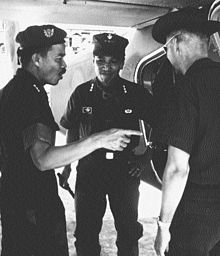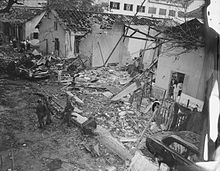December 1964 South Vietnamese coup
Before dawn on 19 December 1964, a coup d'état took place when the ruling military junta of South Vietnam led by General Nguyễn Khánh dissolved the High National Council (HNC) and arrested some of its members.
The dissolution dismayed the Americans, particularly the ambassador, Maxwell D. Taylor, who engaged in an angry war of words with various generals including Khánh and threatened aid cuts.
Khánh, who had been saved from an earlier coup attempt in September 1964 by the intervention of some younger generals dubbed the Young Turks, was indebted to them and needed to satisfy their wishes to stay in power.
The chief of state Phan Khắc Sửu, an elderly figure appointed by the military to give a semblance of civilian rule, did not want to sign the decree without the agreement of the HNC, which mostly consisted of old men.
Over the next few days, Khánh embarked on a media offensive, repeatedly criticizing U.S. policy and decrying what he saw as an undue influence and infringement on Vietnamese sovereignty, explicitly condemning Taylor and declaring the nation's independence from "foreign manipulation".
On 26 September 1964, Nguyễn Khánh and the senior officers in his military junta created a semblance of civilian rule by forming the High National Council (HNC), an appointed advisory body akin to a legislature.
This came after lobbying by American officials—led by Ambassador Maxwell Taylor—in Vietnam,[6][7] as they placed great value in the appearance of civilian legitimacy, which they saw as vital to building a popular base for any government.
Khánh put his rival General Dương Văn Minh—who he had deposed in a January 1964 coup—in charge of picking the 17 members of the HNC, and Minh filled it with figures sympathetic to him.
[6] The HNC, which had representatives from a wide range of social groups, selected the aging civilian politician Phan Khắc Sửu as chief of state, and Suu chose Trần Văn Hương as prime minister, a position that had greater power.
[10][11] In the meantime, both Saigon and Washington were planning a large-scale bombing campaign against North Vietnam in an attempt to deter communist aggression, but were waiting for stability in the south before starting the air strikes.
Khánh put Don, Kim, Xuan and Dinh under arrest in Da Lat after his January coup,[16] claiming they were about to make a deal with the communists, a falsehood to cover up his motive of revenge.
[18] In public, Khánh and the Young Turks claimed the Da Lat Generals and Minh, who had returned from his overseas tour, had been making plots with the Buddhist activists to regain power.
[21] The infighting exasperated Taylor, the US Ambassador to South Vietnam and former Chairman of the US Joint Chiefs of Staff,[3] who felt the disputes between the junta's senior officers were derailing the war effort.
[24] Taylor bemoaned the fact that the generals had shown no second thoughts about ignoring US policy recommendations, particularly in disregarding his explicit advice to maintain stable civilian rule, at least at a nominal level.
[24] Taylor issued a thinly disguised threat to cut aid, releasing a public statement saying Washington might reconsider its military funding if "the fabric of legal government" was not reinstated.
[20] Taylor summoned Khánh to his office, but the Vietnamese leader sent Thi, Kỳ, Thiệu and Admiral Chung Tấn Cang, the commander of the Republic of Vietnam Navy, instead.
[2] Taylor also reminded them of an earlier meeting where he had discussed an American plan to expand the war, increase funding for the South Vietnamese military, and to go on the offensive against the communists at the request of Khánh.
"[21] He claimed some HNC members were disseminating coup rumors and creating doubt among the population, and that "both military and civilian leaders regard the presence of these people in the High National Council as divisive of the Armed Forces due to their influence".
[29] Taylor said the US did not agree with military rule as a principle, and might reduce aid, but Hương was unmoved and said the Vietnamese people "take a more sentimental than legalistic approach" and that the existence of civilian procedure and the HNC was much less pressing than the "moral prestige of the leaders".
[19] Two days later, Khánh went public in support of the Young Turks' coup against the HNC, condemning the advisory body and asserting the army's right to intervene if "disputes and differences create a situation favorable to the common enemies: Communism and colonialism".
[34] A CIA informant reported the recent arguments with Taylor had incensed the volatile Thi so much that he had privately vowed to "blow up everything" and "kill Phan Khắc Sửu, Trần Văn Hương and Nguyễn Khánh and put an end to all this.
[29] The next day, the generals changed their mind and when they met Hương at his office, only asked him to formally denounce Taylor's behavior in his meetings with Khánh and his quartet and to "take appropriate measures to preserve the honor of all the Vietnamese armed forces and to keep national prestige intact".
[29] At the time, Khánh was also secretly negotiating with the communists, hoping to put together a peace deal so he could expel the Americans from Vietnam, although this effort did not lead anywhere in the two months before he was forced out of power.
Taylor said Khánh was completely unprincipled and was stirring up anti-American sentiment purely to try to shore up his political prospects, not because he thought US policy was harmful to South Vietnam.
"[37] The Chicago Tribune lampooned Khánh's junta, calling it a "parody of a government" and saying it would not survive for a week without US support and describing the generals as "remittance men on the United States' payroll".
Taylor gave the journalists his account of the dispute and discussions with the generals, and hoped it would be useful background information for the media, so they would understand what he had done and not reach negative conclusions about his conduct in their writing.
[29] On the same day, the Viet Cong bombed the Brinks Hotel, where US officers were billeted, killing two Americans and injuring around 50 people, civilian bystanders and military personnel.
[44] This resulted in an official announcement by Hương and Khánh three days later, in which the military again reiterated their commitment to civilian rule through an elected legislature and a new constitution, and that "all genuine patriots" would be "earnestly assembled" to collaborate in making a plan to defeat the communists.
[48] After the December coup, Taylor felt the fear of US abandonment "raised the courage level of the other generals to the point of sacking" Khánh,[49] as many were seen as beholden above all to their desire for personal advancement.
[50] In January and February 1965, Khánh sensed he could no longer work with Taylor and the Americans, and that his support in the junta was unreliable, so he began to try to set up secret peace talks with the communists.




